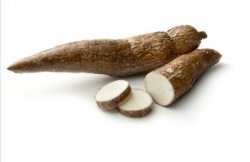Yucca
Other Names: Adam's Needle, Aloe Yucca, Arbre de Josué, Bear Grass, Dagger Plant, Joshua Tree, Mohave Yucca, Mojave Yucca, Our-Lord's-Candle, Soapweed, Spanish Bayonet, Yuca, Yucca aloifolia, Yucca angustifolia, Yucca arborescens, Yucca brevifolia, Yucca filamentosa, Yucca glauca, Yucca mohavensis, Yucca schidigera, Yucca whipplei.
Yucca is a tree. The root of the non-flowering plant is used to make medicine.
The Yucca Plant is indigenous to the Mojave and Sonoran Desert of Southeastern California, Baja California, Southern Nevada and Western Arizona. The Yucca Schidigera is the species used for most medicinal purposes. The plant is commonly called the Mojave Yucca, it is an evergreen flowering succulent plant that grows to a height of about sixteen feet. Yucca leaves contain a high level of saponins, a soapy compound historically used to make soap and shampoo. It is also used as a foaming agent in some beverages and food, particularly in root beer. Native Americans and early settlers used Yucca schidigera as a food. Yucca (Yucca L.) and Cassava (Manihot esculenta) share several similarities. Both are part of the subkingdom Tracheobionta, or vascular plants, and are classed as Magnoliophyta, or flowering plants. However, cassava and yucca are not the same plant. The confusion may stem from cassava often being referred to as yucca. However, cassava belongs to a different family and genus than yucca plants, and each has different cultural requirements and features.
Special Precautions of Yucca
- There's some concern that yucca may trigger a number of side effects (including nausea).
- Yucca Root is generally accepted as safe based on its long history of use as a food. Side effects may include loose stools or diarrhea if Yucca Root is taken in higher than recommended amounts.
- Safety in young children, pregnant or nursing women, or those with severe liver or kidney disease has not been established.
- Because Yucca Root may contain estrogen-like results, it should not be used by women with breast cancer. Utilizing this extract consecutively for more than three months is not recommended as it may interfere with the absorption of fat-soluble vitamins.
The benefits of Yucca are
Yucca Root was used by Native Americans as a stimulating tonic. As a poultice, yucca root was used on skin diseases, inflammations, sores, and to stop bleeding. The root was pounded and put in water in order to stupefy corralled fish so they would float to the surface for easy harvest. Yucca root contains steroid saponins, calcium, potassium, iron, manganese, copper, phosphorus, vitamins A, C, and B-complex. It is an effective anti-inflammatory, antirheumatic, laxative, and alternative.
Yucca Root is used today in the treatment of:
- Gout
- Urethritis
- Prostatitis
- As a Blood, Liver, and Digestive Purifier
- Joint Inflamation
- Arthritis : A 2006 report published in the Journal of Inflammation suggests that yucca shows promise as a natural remedy for arthritis. According to the report, a number of antioxidants found in yucca may help alleviate arthritis by reducing inflammation. However, there is currently a lack of clinical trials testing yucca's effectiveness against arthritis.
- Osteoporosis : Young, tender cassava (yucca) leaves are a good source of dietary proteins and vitamin K. Vitamin K has a suspected role in bone mass building by promoting osteotrophic activity in the bones.
- Neuritis
- Neuralgia
- Rheumatism
- Digestion
- Allergies
- Asthma
- Body Odor
- Stress : Preliminary research indicates that yucca may help fight oxidative stress. In a 2003 study published in Nutrition, for example, laboratory tests revealed that compounds extracted from yucca bark may help protect against oxidative stress by slowing up the production of free radicals in blood platelets. According to the study's authors, this finding suggests that yucca may help strengthen the body's defense against cardiovascular disease.
- Skin Problems
- Aids Digestion
- Liver, blood and digestive system detoxifier
- Topically Yucca Root is used to make soap, is an emollient, and its cleansing properties are used in shampoo and other hair care products.
- High Cholesterol : In a 2003 clinical trial published in Archives of Pharmacal Research, daily ingestion of a combination of Yucca schidigera and the herbal extract Quillaja saponaria for four weeks decreased total and LDL cholesterol levels in patients with high cholesterol.
